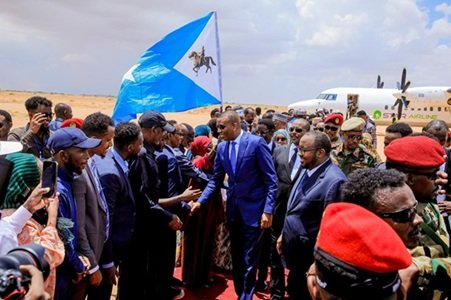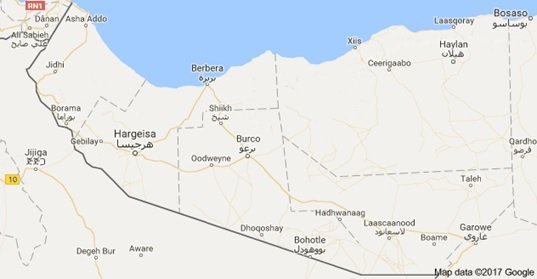By Mohamoud Gaildon
Talk is circulating of a US tilt toward the recognition of Somaliland──a secessionist entity in northern Somalia──as a separate state. From the upper levels of the Trump administration, nothing public in this regard has emerged; but the signs are unmistakable that a pro-Somaliland drive is underway. Such, if it were to materialize, would send a terrible message and heap misery upon misery in this troubled corner of Africa. A brief review of recent history provides a cautionary tale.
First, Some Background
Somaliland’s case for secession rests on a false premise of consent from the population of what in the colonial era was British Somaliland Protectorate. The population herein referred to as the “Somaliland population,’’ standing distinct from the larger “Somalia population,” has no basis in reality──for the merger upon independence between the former British Somaliland and the former Italian Somaliland was one of full fusion between families and communities torn asunder for decades. The truth, in essence, is that, out of four major clans──the Harti (Dhulbahante and Warsangeli), Gadabursi, Issa, and Isaaq clans──Somaliland can conceivably claim to represent only the Isaaq clan. With this background in mind, let’s examine how a misguided approach from the world’s sole supper power, the US, can cause immense harm.
On March 17, 2022, US Senators, Jim Risch, R-Idaho, Chris Van Hollen, D-Md., and Mike Rounds, R-S.D., introduced a bill titled the Somaliland Partnership Act. Before the ink dried, voices of alarm, including mine, rose sharply from communities falsely claimed by Somaliland, communities that abhor Somaliland’s clan-based, secessionist agenda as an existential danger. We saw the act as a misguided measure that would send a terrible message to Somaliland’s leaders: Take full control of the entire former British Somaliland Protectorate in order to make the case for statehood stronger and recognition by the US closer. This meant war on Harti clans in whose territory lies the supposed boundary of separation from the rest of Somalia. Sadly, we were proven right!
Roughly eleven months after the introduction of the ill-advised act, war erupted in and around the city of Las Anod, capital of Somalia’s Sool region, between Somaliland’s army and the local community. Las Anod suffered months of artillery shelling and sniper fire from Somaliland forces including the elite Rapid Response Units (RRU) trained and equipped by Britain. According to a UN report, the violence displaced about 150,000 of the city’s population. In June, 2023, the Security Council called for the “immediate withdrawal of ‘Somaliland’ security forces.” Deeming withdrawal a bitter pill to swallow, Muse Bihi, the then president of Somaliland, chose to rebuff the Security Council. Apparently, he was too intoxicated with the allure of expected American validation and support to see the light. How could he, Muse Bihi, rise so high, have statehood within his grasp, and then allow himself to lose all that and fall so hard within the span of a year!
For Somaliland, the bitter result was a predictable disaster. The local community managed to mobilize the population and amass a formidable force. And when on August 25, 2023──more than eight months from the start of hostilities──the local forces launched a decisive attack, the Somaliland army in the area collapsed within hours. Hundreds of its soldiers, including the highest commander of the fleeing men, were taken prisoner. And almost the entire region of Sool was cleansed of the invading Somaliland army. Soon after, the SSC-Khaatumo administration, in full control of the regions of Sool and ‘Ayn, and a considerable portion of Sanag region, all territory falsely claimed by Somaliland, was born.
Bihi had gambled and lost. But the moral of the story, of particular relevance to US foreign policy, is the unmistakable correlation between Bihi’s aggression and intransigence and the Somaliland Partnership Act.

Now, with the establishment of SSC-Khaatumo, and its recent recognition by Somalia’s Federal government as a bona fide regional administration, a dramatic shift of reality on the ground has occurred. Almost all Harti (Dhulbahante and Warsangeli) territory of the colonial British Somaliland Protectorate is verifiably off limits to Somaliland. (Any interested reader can consult colonial demographic maps and find out how much territory this comprises.) Indeed, SSC-Khaatumo stands as a stark nullification of Somaliland’s central claim to statehood: control of the defined territory it claims. In this light, therefore, and in light of the progression of events since the ill-advised Senate bill of the Somaliland Partnership Act, what can US recognition of Somaliland mean and entail?
US recognition of Somaliland would mean US acceptance of Somaliland’s “right” to wage war on SSC-Khaatumo and, by association, the Harti clans. And if the US followed up the recognition with military and economic support, the consequence might be unimaginable destruction. After all, the specter of Ethiopia’s barbarous assault on Tigray just a few years ago and the world’s aloofness to all that mayhem still hangs heavy on the entire region. Mindful of the likely consequences of US recognition of Somaliland, President Abdulqadir A AwAli of SSC-Khaatumo warns “any recognition of this clan would be entirely unacceptable on two fundamental grounds….” All indications are that a US tilt towards Somaliland will lead to war. And the war may not be confined to northern Somalia. We know how sectarian conflicts can attract foreign powers and escalate into broader conflicts. Libya, the Sudan, and Yemen are prime examples. What would the US gain in this highly probable scenario?
Who is pushing for US recognition of Somaliland? The Heritage foundation and a few former US diplomats whose decades-long, close relationship with Somaliland is intriguing to say the least. The now notorious Project 2025, published in 2023 by the Heritage Foundation, calls for “the recognition of Somaliland statehood as a hedge against the US’s deteriorating position in Djibouti.” So it is all about US military bases in Africa and nothing else! This approach to Africa and Africans has a colonial odor to it. The complete absence of any concern for local populations is vividly reminiscent of how European powers of the 19th century treated Africa.
The empowerment of a secessionist entity to break up a sovereign nation is not a trivial matter. And when death and destruction resulting from such empowerment is a certainty, it is downright criminal. One would expect responsible men and women to be checked by some moral compass before they embark on such an egregious act. Do we know the history? Can we grasp all the relevant facts? What are the likely repercussions? Have we talked to all parties? These are only a few of the critical questions one might have to ask. Far from it, these men──and they are almost all men──have yet to seek well-rounded, balanced, credible information about the facts surrounding Somaliland and its misleading claims. Neither have they ever reached out to any of the communities whose destiny hangs in the balance.
Apparently, such are not questions Heritage deigns to bother itself with, as was the case in the seventies and the eighties when Heritage was America’s chief apologist for South Africa and Rhodesia’s white minority rule. So contrary to world opinion was Heritage’s stance that on the occasion of Nelson Mandela’s triumphant visit to the US this was how Heritage welcomed him: “Nelson Mandela is not a freedom fighter. He repeatedly has supported terrorism.”
Does this mean the US should stay out of the deadly conflict in northern Somalia? Not at all! On the contrary, the US can play a highly constructive role and still gain the strategic advantage it seeks in the Horn of Africa, the Red Sea, and the Gulf of Aden. The US should continue to use its good offices to support Somalia’s territorial integrity, foster peace, discourage inter-communal violence, push for equitable distribution of foreign aid, and help local Somali communities resist terrorist infiltration. The clans on the opposite sides of the conflict in the former British Somaliland Protectorate have many things in common, as do all Somalis, including extensive intermarriage and intertwined livelihoods. There’s much to gain from peace. But for peace to prevail and endure, violently-imposed secession must be taken off the table, something the US can work towards. Recognition of Somaliland’s statehood would run counter to all these objectives and unleash a new wave of unending violence.
Mohamoud Gaildon
Email: mgaildon@aol.com
————–
Mohamoud Gaildon is a Somali-American medical physicist. He has worked in a number of major hospitals including Memorial Sloan-Kettering, Beth Israel, and Mount Sinai of New York City. He is now a senior medical physicist with OSF HealthCare, Illinois. Mr. Gaildon is also the author of a novel, The Yibir of Las Burgabo.


Leave a Reply